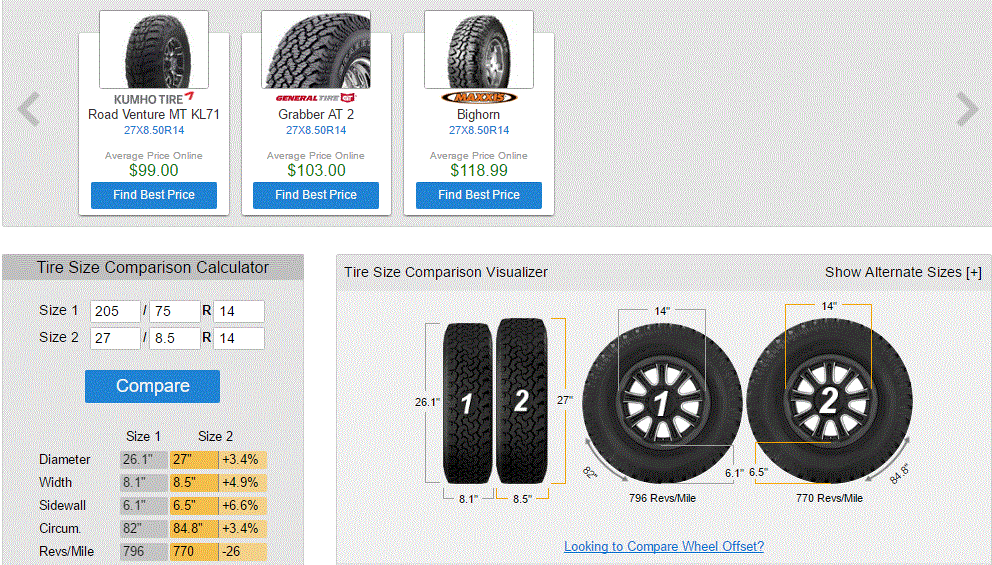Tirerack.com wrote:Trailer Tires vs. Passenger Vehicle Tires
There are differences in the driving requirements between the tires on your trailer and those on the car or light truck you use to tow it. Therefore, there are distinct differences between the way trailer tires and tow vehicle tires are engineered.
Your tow vehicle is a leader, which means traction is a key focus in the design of its tires. Traction allows your tow vehicle to accelerate down the road, turn around the corner and brake to a stop. Another important consideration is tow vehicle tires are designed for ride comfort, which is achieved in part by allowing their sidewalls to flex.
Your trailer is a follower, which often makes tire sidewall flexing a negative. Sidewall flexing on trailers, especially those with a high center of gravity (enclosed/travel trailers) or that carry heavy loads, is a primary cause of trailer sway. Typical passenger radial tires with flexible sidewalls can accentuate trailer sway problems. The stiffer sidewalls and higher operating pressures common with Special Trailer (ST) designated tires help reduce trailer sway.
"Trailers will be more stable and pull better on tires designed specifically for trailer use. Since Special Trailer (ST) tires are constructed with heavier duty materials, they are tougher than typical passenger vehicle tires."
Also consider that Special Trailer (ST), as well as Light Truck (LT) tires are fully rated for trailer applications. This means ST- and LT-sized tires can carry the full weight rating branded on the sidewalls when used on a trailer.
However when P-metric or Euro-metric tires are used on a trailer, the load capacity branded on the sidewalls must be reduced by 9%. This means P-metric or Euro-metric tires with a maximum branded load rating of 1,874 lbs. for use on a car is only rated to carry 1,705 lbs. when used on a trailer.
Comparing the load capacities of a pair of tires of the same dimensions fitted to a single axle trailer, ST225/75R15 Load Range C-sized tires inflated to their maximum of 50 psi provide 4,300 lbs. of load capacity, where P225/75R15 Standard Load-sized tires inflated to their maximum of 35 psi would be limited to 3,410 lbs. of load capacity, a total reduction of 890 pounds.
Trailers will be more stable and pull better on tires designed specifically for trailer use. Since Special Trailer (ST) tires are constructed with heavier duty materials, they are tougher than typical passenger vehicle tires. This is a plus because trailer suspension systems are generally stiffer and less sophisticated than automotive suspension systems.
JaggedEdges wrote:Load rating, load rating, load rating, auto tires only go on auto rims, trailer tires only go on trailer rims, run (whatever) tires on trailer at max sidewall cold pressure always, it runs coolest and supports the most.
Get a tire rated 20% over half the axle load rating at least, leaves room for Murphy,
Do not expect an auto tire rated high enough load to actually fit in the wheel well of your factory trailer. ST tires mostly have much higher load ratings for their size than P tires and as they get larger, LT tires even. Modifications to accommodate your preferred tire are on you.
Rims, auto tires, use auto rims, trailers often want a negative offset though, if a rim suitable to swap on your vehicle is high positive, then you may need to use spacers on the trailer, getting this right, modifying the hub, ensuring the bearing can take the load if the centerline of the combo is off, all on you.
I've always used ST trailer tires on my trailers, not just putting old P235-75 R15 truck or SUV take-offs on my trailers, like many of my friends did with theirs.
When I look at most lawn service trailers around here, most have balding tires of that size on them. Just my observation! I also note, that in the car community I came from, most carhauling trailers used automotive wheels, too, some aluminum and some with varying amounts of offset. My own carhauler had slightly offset wheels that matched my '69 Chevy 1500 (I bought 10 used 6-lug wheels, for truck & trailer to match). No problems were caused by the small offset, no bearing wear or tire scrub on either truck nor trailer. I can't say the same for some combinations I've seen, though. I will probably replace the Chevy wheels on my carhauler trailer, with proper trailer tires and wheels, probably already mounted as a set, but not now. I'm replacing the old ST tires on my TTT , weighing under a ton, with LT tires on my trailer-specific wheels. According to
Tirerack.com, I can do so. I have no concerns about the extra flex of the thinner sidewalls, since I intend to inflate them to recommended pressure (and reduce it if I need to, but only a bit, if there is no noticeable sway). I've run tire size comparisons online (and also been assured by a fellow member of Exploration Portal who made the exact tire change I'm doing) that the tire will fit , and carry the load of my trailer.

- new vs old tires v.2.GIF (157.4 KiB) Viewed 10729 times
The ST tires had a load rating of 1760 lbs per tire- the LT tires have a load rating of 1520 lbs per tire; either tire is sufficient for my 1700 lb trailer. I don't feel the 1/2" tread depth (of the LT tire) will add to squirm or sway of the trailer; the flatter tread will grab the road better, and should give better traction than the thinner, shallower tread of even new ST tires. I've towed mainly tandem axle trailers, loaded weight from 2.5 tons to 5 tons...they are a different animal than the smaller single-axle trailer, and can followa slightly more lenient tire rule (within reason). Choose wisely!

